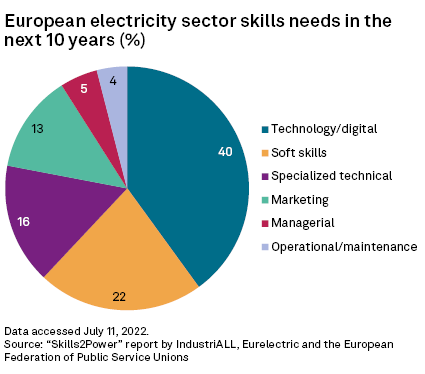One of the more defining factors of the energy industry is the constant growth it is experiencing, even in moments of worldwide crises. These factors, combined with government investments in alternative energy sources are creating new job positions of varying skill levels to meet this new demand. This results in more professionals transitioning to renewable energy and more companies looking for young talent to spearhead the shift to a more sustainable future.
An Overview for Graduates
Because many energy industry jobs are technically complex and require postgraduate qualifications, the graduate jobs available tend to offer some of the highest starting salaries of any industry. According to a study from the Institute of Student Employers, the average starting salary in the UK’s energy industry is £28,000 – the fifth highest of any industry. The same article states that over 80% of energy jobs by 2050 are expected to be in renewables. This calculation is done by taking current policy scenarios using an integrated assessment model under three shared socioeconomic pathways.
Other statistics from the study include a prediction that the energy sector will grow from today’s 18 million jobs, to 21 million by the year 2050. Countries such as China who are heavily dependent on coal and fossil fuels are expected to lose some jobs, but other regions such as the Middle East and North America are expected to gain more jobs due to renewable energy expansion and investment. These lucrative statistics and salaries plus the rising demand for young talent in the industry lead to exciting prospects for graduates.
How to Find the Right Role
A graduate should start off by understanding their interests and abilities. Many employers encourage people to develop skills in other areas, so applicants should not be afraid to apply for energy sector jobs that may not perfectly align with their degree. Once a candidate understands their interests it is time to explore the many employment initiatives many energy companies offer, such as placements and graduate programs.
To fit the demands of the market role established, the ideal candidate would have developed the right skills and experience. This is done through paid roles, work placements, training programs, further education or conferences.

The image above shows the skills needed in the next 10 years by the Energy sector in Europe. The industry is in need not only of workforce with technical background, but also with marketing, managerial or IT backgrounds.
A Winning Application
After building yourself through education, skill development and experience, it is time to start applying for jobs. A good start is looking for entry-level energy jobs or graduate energy jobs that align with your skillset. A permanent role is more likely to provide a greater sense of structure compared to contract work, which is important in a first job for many.
Personalizing your CV and cover letter to tailor to the specific requirements of the role helps a long way. Before an interview it is important to have your research done on the employer and to be prepared to discuss technical capabilities as well as social competences. In case the interview is conducted online, test the technology and internet connection. Sit on a place that is visibly pleasant and well lit, with the light coming from the front, so you can be seen well on the camera.
Conclusion
Once you have your first role secured, make sure you stay committed to yourself by continuing your training and development. Many employers offer the ability to reskill or upskill yourself, especially as businesses increasingly pivot to renewables. Taking advantage of these opportunities increases one’s employability.
WTS Energy is committed to providing a wide range of vacancies ranging from entry-level to senior level all around the world. Our experienced recruiters know exactly what it takes to secure a meaningful role in the energy industry. To view our available vacancies follow the link.
About the author




